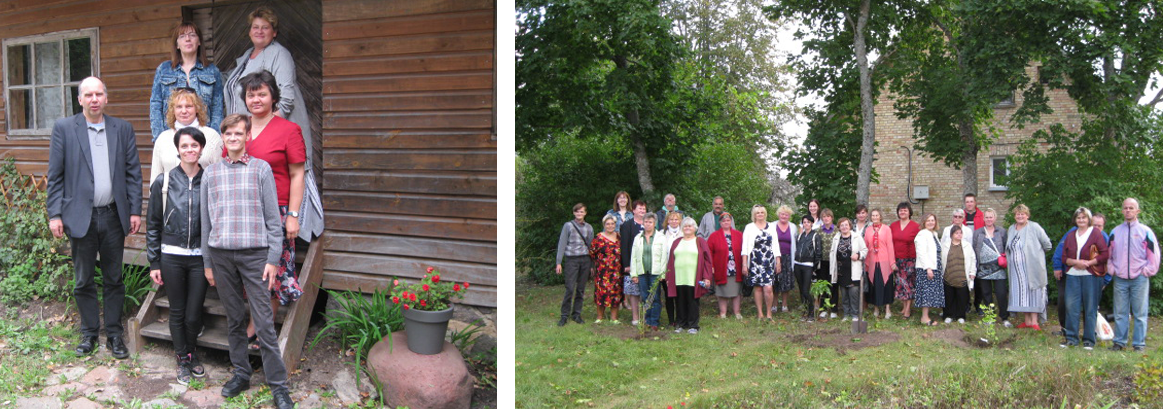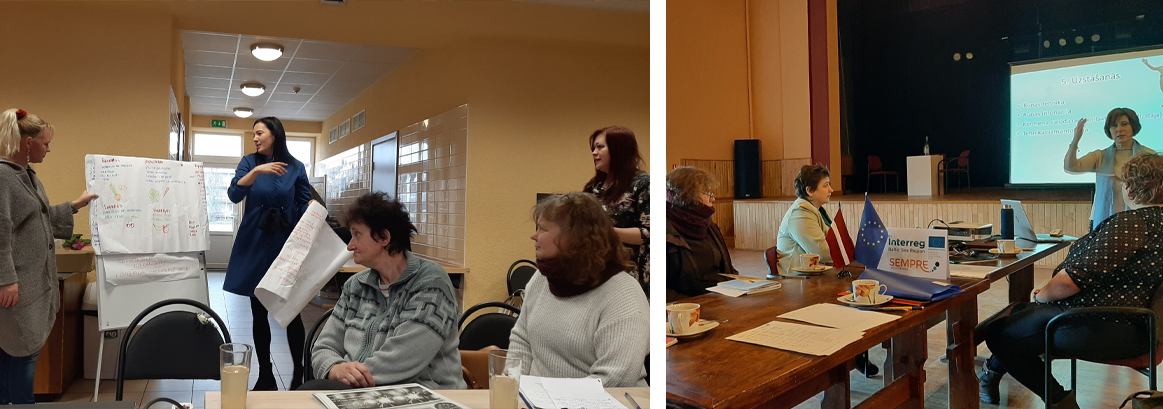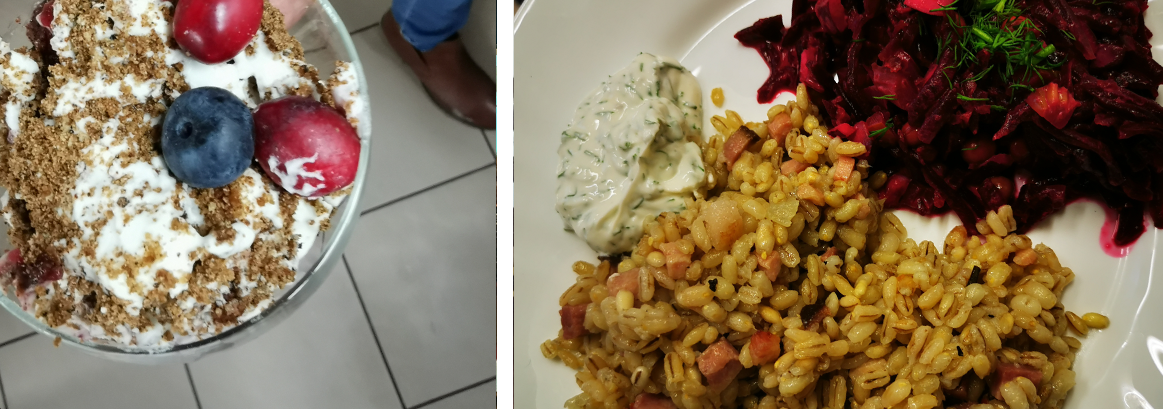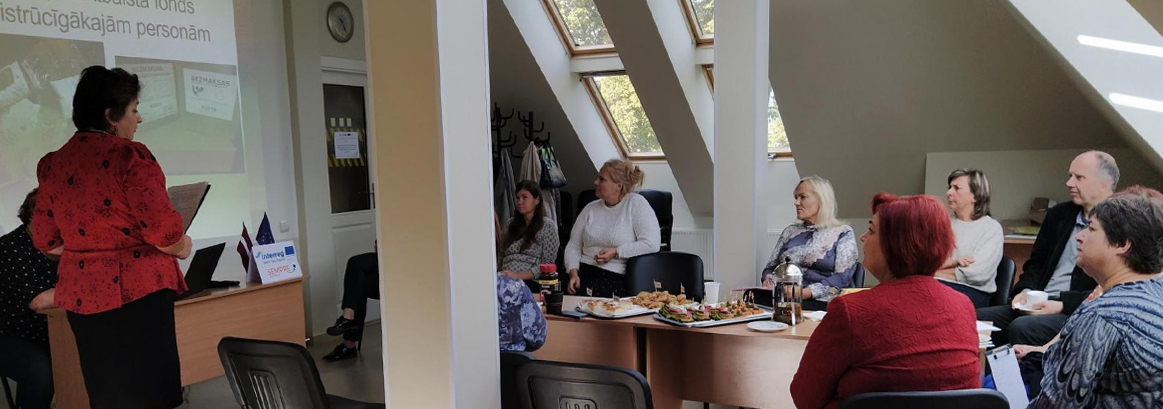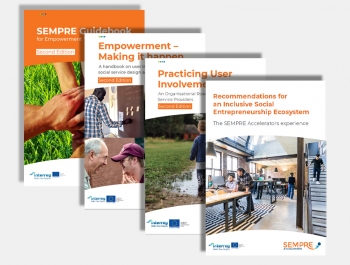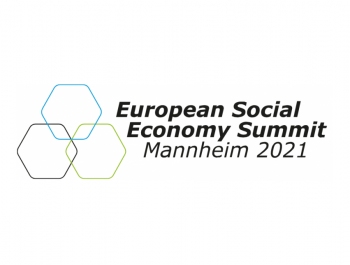Location: Municipality of Rucava, Latvia
Vulnerable group in focus: People with disabilities
Coordination: Diaconal Centre Liepaja, Karina Krievina
Do you speak Latvian? Visit the local blog of this micro project.
|
Social Start-Up Biography On this page we want to document "How to Eat Healthy, Cheap and Tasty?" and its development into an independent social start-up. To take you with us on this journey, we update this interview diary every other month. If you have further questions, feel free to contact the local coordinator (see above). If you want to learn more about certain terms you may encounter here (such as "micro project", "social start-up", "Accelerator Team" and the like) please check our "the ideas behind the project" section. |
| Choose your issue of the "How to Eat Healthy, Cheap and Tasty?" biography: DEC 2019 FEB 2020 APR 2020 JUL 2020 OCT 2020 DEC 2020 APR 2021 |
|
Tell us about your Micro Project in three sentences! Here in Rucava (Latvia) throughout the past years, we - social service providers together with people with disabilities - co-created a recipe brochure for people with low income. The brochure is distributed through EU food boxes to people in need. During the creation of the brochure, the participants developed new skills (both in terms of cooking and compiling the brochure) and developed a sense of group identity and belonging. Now, with SEMPRE Accelerators, we want to transfer this approach to other municipalities, provide training courses and form a stable organisational structure for the initiative.Who are the persons behind the initiative? At the core of the project are end-users (i.e. the members of the initiative that actually developed the recipe brochure). They are accompanied by the Diaconal Centre Liepaja, by social workers from municipal social service departments as well as further support groups. What are your long-term goals? In SEMPRE Accelerators, we are working on three main activities. Firstly, we want to develop a training course for members of three support groups for people with disabilities in the region of Rucava who mostly receive the food packages from the EU. The course should provide complementary knowledge and skills on how to eat healthy, cheap and tasty. The training course shall consist of several sessions, each comprising both an informational part and a practical cooking activity. Secondly, we want to find out if and how the initiative can be transferred to other municipalities in Latvia. Thirdly, we intend to develop a mature organisational structure for our work to ensure that we can continue with our activities beyond SEMPRE Accelerators.
Which topics do you currently address in your start-up? One of our core activities is offering trainings courses for support groups for people with disabilities. Through the courses these groups want to learn more about our how to eat healthy, cheap and tasty. At the end of last year we offered such a training course for the second time. During the course the parrticipants learned from a nutrionist and a medical assistant through their presentation about “alternatives for unhealthy groceries and different recipes”, but the course also included practical activities, such as a live meal preparation. What were your recent challenges? Our thematic focus is on cooking. However, from an organisational perspective, growing, stabilising and professionalising our initiative also requires further skills. We realized that some of our micro project members and participants had special training needs with regard to actively speaking in front of larger groups, which of course plays an important role when conducting our training courses. Against this background we organised a seminar about “speaking in public” in January which was very helpful. What are your short-term goals for the next months? We identified several topics on which we want to work during further training seminars with our “Accelerator Team”, in particular group dynamics and leadership as well as different methods how to involve the entire group more effectively. In the longer run, roughly until fall, we want to set up an NGO for the support groups in Rucava. Our next step is to find out more about the different options. Therefore we will contact a nearby NGO that has a similar structure and learn about their structural setup and their experiences.
Tell us about your recent achievements at "How to Eat Healthy, Cheap and Tasty?". In our Accelerator Team, we continued with another training on speaking in public; the session was facilitated by a lecturer from the local University. This training helps the members of the support groups in our Accelerator Team to improve their skills in public speech and they learn how to present their part at the “micro project breakfasts”. Like all start-ups of SEMPRE Accelerators, we will organise such a breakfast event, which is a tool to bridge the gap between social service providers and members of the social start-ups. At this occasion, our colleagues from the support groups will inform social service providers about their start-up; so this is another reason why we do this training. Last time, one presenter from our group spoke about the history of “Ray of Hope”, the first support group here in Rucava, that was founded at the beginning of the SEMPRE project. Another speaker decided to present the recipe brochures we are working on. Apart from this training, we were just about to plan other activities, such as a job shadowing, when COVID-19 changed everything. Speaking of the pandemic, what impact does it have on your start-up? For us, almost all planned activities were stopped. We hope that step by step the restrictions will become less so that we can restart the planning of our training course and further activities. In the meantime, we started to work with Action Learning on a remote basis (via questionnaires and online meetings), and we hope that this way the members of our social start-up can evaluate their own activities, identify actual problems and possibly even start new activities to continue the work of the start-up and the support groups. We hope that this will encourage our start-up members to take over responsibility and develop the project despite the restrictions. Maybe we will find new solutions that we did not even think of before!
While the pandemic-related restrictions are slowly being lifted in most parts of Europe, the situation remains challenging. Still, is there anything positive that you take with you from this crisis? Indeed, the situation is still difficult for our social start-up and its progress. However, we also received the feedback that our training course „How to eat healthy, cheap and tasty?” has been very successful and useful, especially in these times of crisis. People with low income now plan their meals and save money. They are happy that it is not necessary to invest large sums of money for eating tasty food. Moreover, people can use the information they have gained from the training course for new recipes. What is also very important in the current situation is mutual support and the sharing of ideas about how to prepare food. The participants support each other and also have more confidence to create new recipes and forms of cooking.
One of your long-term aims, as discussed here in the start-up biography about half a year ago, is the foundation of an NGO to stabilize the “How to Eat Healthy, Cheap and Tasty?” initiative. How did you progress towards this goal? Between February and June we were unable to meet in person due to the pandemic. Now we are glad that we are able to meet again to proceed with our planned activities. Once we were able to see each other again in person, we discussed several questions related to the foundation of an NGO and how to succeed with the gradual shift of responsibilities towards the participants themselves. In the long run, it should be them who drive this project. The team agreed that regular meetings are very important, as the participants feel more secure when acting together. What are your next steps in this regard? Our Accelerator Team has to develop a work plan, define the aims and tasks. After this the statutes of the future NGO could be written. We believe that the main success factor in this process is communication between the members of the Accelerator Team and our local support groups. Moreover, support networks are of great help, i.e. a network of stakeholders from which we can get support, if needed.
In our last interview we focused mostly on the NGO you want to form. Let’s move back to your work on the ground today. What are your current experiences in the cooking classes? A few weeks ago, we had the final training session of the course “How to Eat Healthy, Cheap and Tasty” course. In the first part of the course, the 25 participants recalled the last session and did physical exercises led by a gymnastics teacher. This was very refreshing. Afterwards we had a common meal prepared by a cook with the help of participants from the support groups. In the second part, the teacher Aija Cinkmane spoke about the theme “How to find information about the preparation of meals and recipes?”. Afterwards, every participant got a certificate for attending the training course. The whole event was filmed and should later be edited as a video clip. Which other activities did you pursue throughout the summer?
To foster mutual learning across borders and contexts, the social start-ups of SEMPRE Accelerators set up a visiting programme. In our case, we visited our partners from the Vidzeme University in Valmiera. Moreover, we welcomed our fellow social start-up from Harkujärve here in Liepaja. Pictures and further details of the visit are also available in this news article.
Moreover, in September we organised a breakfast event where our social start-up met with the social service in Liepaja. A core principle of SEMPRE Accelerators is that the users of social services are involved in the co-creation of social start-ups. Together with social service providers, they jointly set up stable and efficient management and leadership structures for their social start-up and make it fit for the future. To bridge the gap between social service providers and members of the social start-ups, SEMPRE Accelerators employs several tools. One of them is the “social start-up breakfast”: in a breakfast atmosphere, the start-ups get the chance to present their achievements to a broader audience of social service provider staff. At the same time, the event is a possibility to establish informal contacts and explore networking which may turn out helpful in later stages of the start-up development.
During the meeting, we introduced our initiative “How to Eat Healthy, Cheap and Tasty?” and learned about the work of the social service. They were very much interested in our recipe brochure the exchange of experiences was helpful for us. In our Accelerator Team we had prepared quite a long time for this event, and were a little nervous how it will work. When we asked about own possibilities to involve their end-users in different activities, several participants had own ideas how to involve the inhabitants of the social houses in preparing a meal with EU food boxes. For us, it was very positive that there was real interest and need for support and consultation for own activities. Below is a picture of the event.
Welcome to our last interview! Today we would like to come back to the three main goals that you and your Accelerator Team co-defined. Let’s begin with the training course. Did you succeed with it? Indeed! We organised several classes, and last summer we even welcomed up to 28 participants at a class in Sikšņi village, Rucava Municipality. Later, the situation became more difficult again: From November, Latvia experienced another lockdown due to the pandemic. In this period, we were unable to meet in person and tried to exchange online as good as possible. In our first interview we also talked about the transferability of these classes. For us it was an important activity to find out whether what we do here could also work in other municipalities, or with other social service providers. For this purpose we exchanged with social workers from other regions and developed a brochure (in Latvian language) that might serve as inspiration for others. And what about your plans to develop a more stable organisational structure? At first, we wanted to formally establish an not-for-profit organisation. We made significant progress in this regard. The entire Accelerator Team contributed, and we even already developed the statutory documents for the future organisation. Unfortunately, our plans were suddenly put on hold due to changing political-administrative circumstances. In Latvia, there is an upcoming regional reform, in which Rucava parish will be added to Grobiņa, creating a bigger entity with a center in Grobiņa. Therefore, municipality representatives couldn’t make any promises. Nonetheless, we will continue working towards establishing an NGO. But even without this formal structure, “How to Eat Healthy, Cheap and Tasty” is much more stable than it was one and a half years ago. Earlier this year we evaluated our progress using the NOPRA model, and one of the results was that the participants felt a new community spirit and that each member found its role within the organisation. Eventually, stability is not just about papers, but relies on a strong spirit in the group. |


